Blending Borders #7
Blending Borders
A Fortnightly Newsletter
September 7th, 2021
Issue #7
This Newsletter explores ongoing issues and perspectives from India’s neighbouring countries, including - Sri Lanka, Bangladesh, Nepal, Myanmar, Bhutan, Maldives and Afghanistan.
Before I begin this issue, I want to bring your attention to the Takshashila Institutions latest Global Outlook Survey:
The survey is an effort to bridge the knowledge gap around how Indian policymakers, the strategic affairs community and ordinary citizens view the world and India’s role in it. The survey consists of 26 questions and takes about 6-7 minutes to complete. If you are interested, click this link and register your views.
Now, let us move on to today’s issue.
The Raging Pandemic
On August 28th, Sri Lanka received a batch of 300,000 doses of the Sinopharm vaccine donated by the Chinese People’s Liberation Army (PLA). A local report said on September 5th that another batch of 4 million doses of the same arrived in the island nation. According to Chinese state media reports, 18 million doses of the Sinopharm vaccine have been received in Colombo, the leading vaccine being administered in the country. According to local news, Sri Lanka also received a batch of 92,430 doses of the Pfizer-BioNTech vaccine on the morning of September 6th.
Meanwhile, Bangladesh has received another 6,34,900 doses of the AstraZeneca vaccine under the COVAX scheme on August 28th, said The Dhaka Tribune. It also received a batch of 1 million doses of the Pfizer vaccine as a gift from the U.S on September 1st. The E.U Head of Delegation to Bangladesh Ambassador Rensje Teerink promised to deliver 10 million covid vaccine doses to Bangladesh.
Yet again, China is scaling up its vaccine donations by sending 1 million doses of the Sinopharm vaccine to Myanmar. Additionally, Beijing donated about $3.1 million worth of medical supplies, including respirators, oxygen generators, protective gear and surgical masks, said CGTN. The Philippines has also pledged to donate vaccines to Myanmar, and Foreign Affairs Secretary Teodoro Locsin Jr. revealed this on August 31st, said a local report.
Finally, Bhutan continues to impress with its handling of the pandemic situation and vaccination drive in the tiny kingdom, as expressed in this tweet by a leading journalist and the President of Media Association in Bhutan:


Sri Lanka-Bangladesh Agreement
Bangladesh has reportedly released another $100 million more out of the $200 million currency swap agreement with Sri Lanka, bringing the total to $150 million now. The funds were released as a result of the swap agreement signed between the Bangladesh Bank and the Central Bank of Sri Lanka on August 3rd. A local Sri Lankan report also said that the Ministry of Finance has announced that the International Monetary Fund (IMF) has given $780 million to Colombo in addition to the loan received by Dhaka. The same report mentions that a further loan of $300 million is said to be granted by the Chinese Development Bank in the future. As a result of these loans, foreign reserves in the country have reportedly increased.
China-Sri Lanka Ties Worry India
According to TOI, China is reportedly expanding its presence into the Northern part of Sri Lanka, raising concerns in India. According to the report, Chinese infrastructure-related activities were initially restricted to Southern Sri Lanka, but it is now widening its footprint and attempting to woo the Ethnic Tamil community in the North. A source in the Indian security establishment was quoted saying, “Proliferation of Chinese economic activity and proposed infrastructure development projects in the Northern province of Sri Lanka, which could later be exploited for strategic reasons, is certainly a matter of concern for India”. New Delhi is upset over the close relationship between Beijing and Colombo as the Chinese attempt to establish a presence as close as possible to the Indian coast. But, Sri Lanka and China are continuing to strengthen development relations, and it is a matter of wait-and-watch for the Indian government now.
Meanwhile, Italy and Sri Lanka have agreed to continue close cooperation and dialogue on matters of trade, investment, tourism, political, economic and cultural relations and people to people ties. A local report said that the Ambassador of Italy to Sri Lanka, Rita Guiliana, had paid a courtesy call to Sri Lanka’s Foreign Minister Prof. G.L Peiris on the continuing dialogue between the two countries.
Sri Lanka’s worsening economic crisis
MoneyControl reported on August 31st that Sri Lanka had declared a food emergency as private banks ran out of foreign exchange to finance any imports. President Gotabaya Rajapaksa ordered emergency regulations to tackle the hoarding of sugar, rice and other essential items. However, according to another report, the Colombo government has denied reports of a food shortage and underlined that a public security ordinance on the supply of essential goods was only imposed to stop hoarding of food items. A press release issued on September 2nd quoted the Government Director of Information saying, “Certain local and foreign media are carrying out media stories that there is a food shortage in the country. There is no basis to these reports”. Sri Lanka has been facing a worsening economic crisis though as its foreign reserves fell to $2.8 billion at the end of July, from $7.5 billion in November 2019 - according to bank data.
Read this full article to understand the main reasons why Sri Lanka is facing a sudden financial and economic crisis - as predicted by experts.
Finally, the New Zealand High Commission in Sri Lanka released a statement condemning the recent terror attacks in Auckland on September 3rd. The attack was carried out by an extremist from Sri Lanka who was living in New Zealand.
India allows import of GM Soymeal from Bangladesh
A report in The Indian Express mentioned that about 50,000 tonnes of genetically modified (GM) Soyameal had arrived in India via West Bengal. It is the first time the government of India is allowing the import of GM raw material for making poultry feed since gaining Independence. The import from Dhaka came as a result of a sharp rise in the price of Soyameal and a shortage of the item.
Meanwhile, the Bangladesh Chief of Army Staff General SM Shafiuddin Ahmed left on a 3 day official visit to India by a special Bangladesh Air Force aircraft on September 4th. According to a press release, the chief is scheduled to meet with India’s Chief of Defence Staff, Chiefs of Army, Navy and Air staff, Secretary of Defense, and other top officials in the military.
From the Indian side, an offshore patrol vessel INS Savitri arrived at Chattogram harbour in Bangladesh carrying oxygen to support the country’s fight against the ongoing wave of the pandemic in the country:

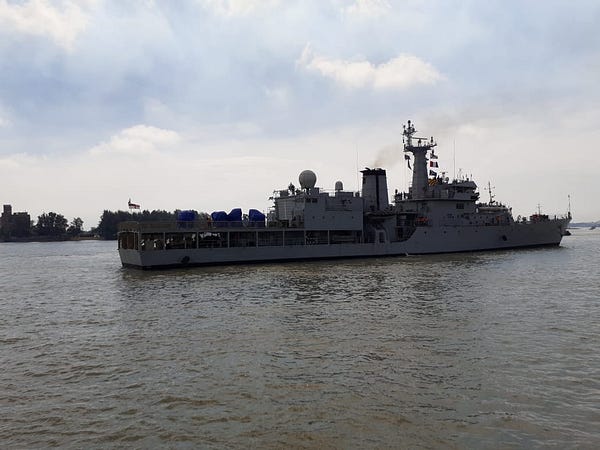
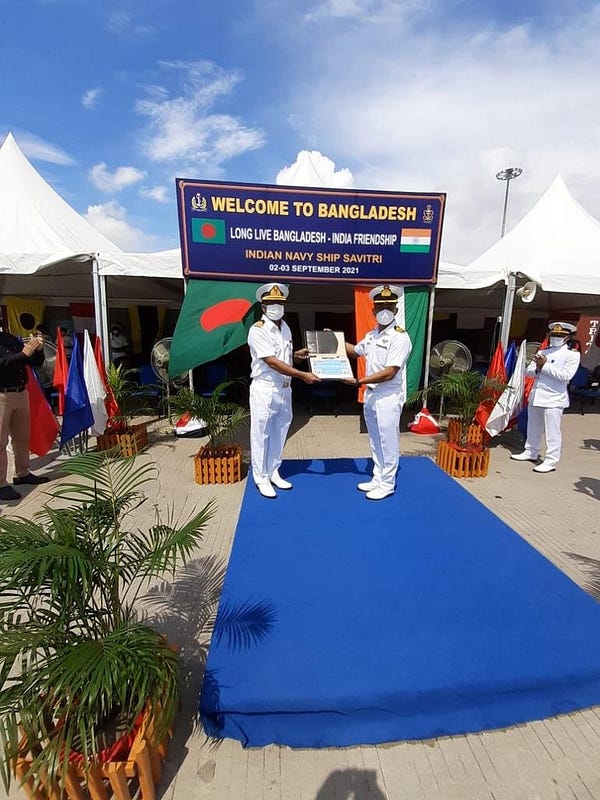
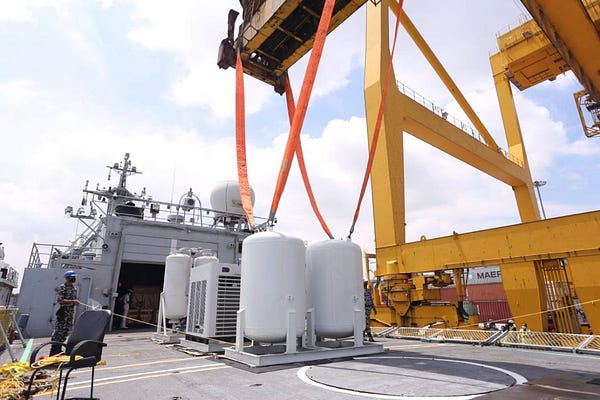
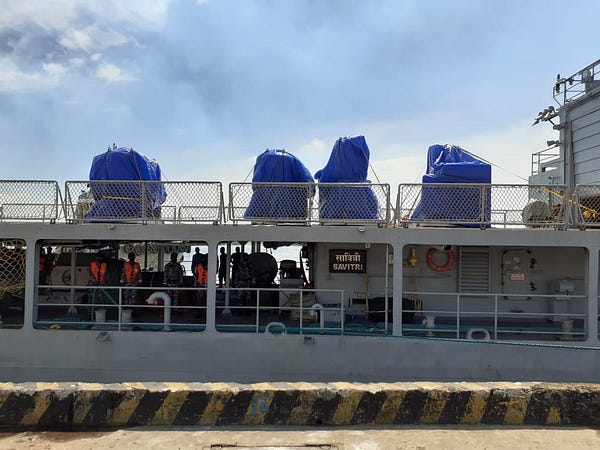
And on August 29th, a groundbreaking ceremony was held in Cox’s Bazar in Bangladesh for the first maritime airport runway expansion project constructed by the China Civil Engineering Construction Corporation.
Turkey-Bangladesh deepen relations
A report by The Daily Star said that Bangladesh and Turkey are putting an end to their diplomatic row and deepening relations for political gains on both sides. Turkey wants to regain its position as an Islamic power, and Bangladesh sees a relationship with the former as essential to resolve the Rohingya crisis and boost trade. According to the report, the two countries want to boost trade from $1 billion to $2 billion and said officials from both countries are expected to conduct meetings later this year. Bangladesh and Turkey have already been strengthening defence cooperation, and “Bangladesh is set to become one of the top defence equipment clients of Turkey in the next five years”. Also, Turkey’s President Recep Tayyip Erdogan intends to expand Turkey’s defence industrial sales by boosting arms sales to $25 billion by 2023, and it is eyeing Bangladesh as a critical market for this, further stated the report.
Amnesty International criticizes Bangladesh’s Digital Security Law
According to a legal news publication by the University of Pittsburgh, Amnesty International published a report on August 26th highlighting the crackdown of freedom of speech and expression online due to the country’s controversial Digital Security Act (DSA). Under Article 21, a draconian law criminalizes digital campaigns against the country’s liberation war, the father of the nation, its national anthem or its national flag. Likewise, Sections 25 and 29 criminalize “false, offensive, derogatory and defamatory information”, which contravenes the International Covenant of Civil and Political Rights and overlooks recommendations made under international human rights law and the right to freedom of expression from the Universal Periodic Review in May 2018.
Bangladesh is listed among the top 10 countries to host the most number of refugees - standing at the ninth position and hosting a total of 860,000 refugees. And finally, the board of governors of the New Development Bank (NDB) has approved the entry of the UAE, Uruguay and Bangladesh as new members after a round of successful talks in late 2020, said a report. The NDB was established by countries of the BRICS (Brazil, Russia, India, China, South Africa) group back in 2015 to finance infrastructure projects in developing nations.
India-Nepal sign MoU for the reconstruction of projects damaged by Earthquake
According to The Hindu, India and Nepal signed an MoU on September 3rd to reconstruct 14 cultural heritage and 103 health sector projects damaged by the 2015 earthquake in the country. The report says that the budget allocated for the reparations by India includes a total grant of $250 million, including $50 million individually for education, cultural heritage and health, plus $100 million for the housing sector.
The Kathmandu Post reported on August 29th that the budgetary allocations for the repayment of domestic and foreign debts in Nepal almost tripled in the last five years. The report mentions a white paper titled ‘Information on Current Economic Situation in Nepal’, which states that Nepal’s public debt went up to Rs.1,729 billion in the fiscal year 2020-21 from Rs.698 billion in the fiscal year 2016-17. As a result of this, the debt to GDP has soared to 40.5% from just 22.7%. Experts warn that the government must be sensible in its borrowing, keeping in mind the current debt to GDP ratio.
India hosts 8th meeting of agriculture experts of BIMSTEC countries
India hosted the 8th meeting of agriculture experts of BIMSTEC countries virtually on August 31st. The meeting was attended by experts of agricultural ministers from Bangladesh, Bhutan, India, Nepal, Sri Lanka, Myanmar and Thailand. The meeting called for these countries to enhance cooperation in agriculture among BIMSTEC members and promote digital agriculture. It also stressed the need to address concerns related to biosecurity and biosafety.
Meanwhile, Bhutan highlighted the importance of India’s support to Bhutan in education in a tweet with a news clipping in it:

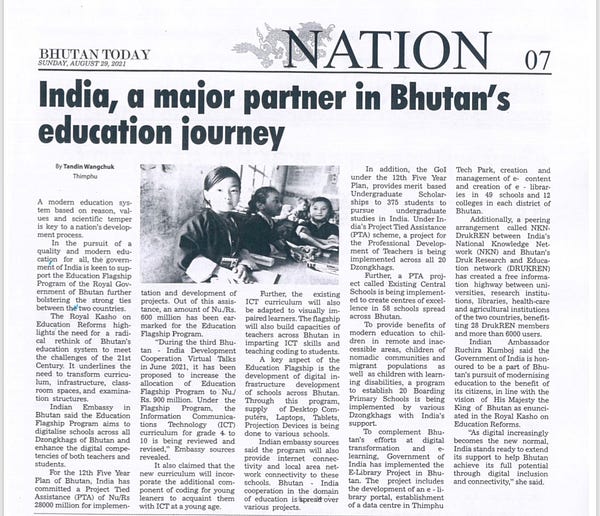
And do read this blog post published by a local Bhutanese news publication to know more about the significance of the Jaldhaka Hydropower project in Bhutan-India relations.
Maldives-India Uber connectivity project
A report by The Hindustan Times said that India will be signing the largest ever infrastructure project known as the Greater Male Connectivity Project (GMCP), which will be developed by a Maharashtra based construction and engineering company called Afcons. The project is said to boost connectivity between four islands that account for half the population. The report says the project will act as an economic lifeline for the island nation and has been funded under an Indian grant of $100 million and a line of credit of $400 million.
Read this detailed commentary published by the Observer Research Foundation (ORF) on the project and how it is different from a similar China-funded venture on the island if you want to know more.
And finally, Maldives and Turkey have signed an agreement to develop the tourism sector on both sides. After signing the agreement, discussions also took place on how both countries can develop their air service connections and transport services through the sea.
China’s new trade route with Myanmar
A recent article in Bloomberg talked about the possible opening up of a new trade route by China in Myanmar as a show of support for its neighbour. The new route could help boost trade between the two countries and help link China with the Indian ocean. Meanwhile, Myanmar ethnic rebels have killed at least 23 government soldiers after days of fighting near the border with China, said a report by The Hindu. This could be worrying for Beijing, its powerful neighbour.
Myanmar-Russia deepen ties since the coup takeover
A local Burmese report said that bilateral relations between Russia and Myanmar have reached a new level since the coup took over in February. The regime’s spokesperson, Major General Zaw Min Tun, praised Russia for its advanced weapons technology. He added that the junta wants a world-class run Russian air defence system, hinting at the closeness of the relationship. According to Russian media, the report also says that the two countries have discussed strengthening military relations and increasing technological cooperation. The Russian Foreign Minister Sergei Shoigu also paid a visit to the country. Coup leader Senior General Min Aung Hlaing has also made visits to Moscow. The relationship is a two-way streak.
China has also made visits to Myanmar recently. Reportedly, China’s special envoy for Asian affairs met with Myanmar regime leader Min Aung Hlaing and other officials during his visit to the country sometime in the last week of August.
According to local media reports, a Hong Kong energy firm known as Vpower has announced that it is pulling out of two projects in Myanmar. The company has a stake in nine power plants across Myanmar, and it has said that it will not be renewing contracts with any of the power stations. The reason cited for these actions is the post-coup turmoil in the country that has been going on since February. And finally, a Lebanese investment firm, M1 group, pledged to spend $300 million over the next year to expand Myanmar's telecom business which it is buying from Norway’s Telenor ASA. The funds will reportedly be used for network expansion, broadband infrastructure and services, according to the CEO of M1 group.
UN commits to staying in Afghanistan
The United Nations put out a report on August 31st, saying UN Secretary-General Antonio Guterres has expressed deep concern following the takeover in Afghanistan. The deepening humanitarian and economic crisis is alarming. He was quoted saying, “Now more than over, Afghan children, women and men need the support and solidarity of the international community”. The UN has committed to stay in Afghanistan as basic services are collapsing in the country.
Meanwhile, according to a report in Mint, about 600 people have been killed in Afghanistan's northeastern province of Panjshir. The Taliban resistance in Panjshir has allegedly slowed down due to the presence of landmines in the area, but the fighting is still ongoing.
India sparks concerns over Taliban takeover
A report in The Hindustan Times said that India is keeping a close watch over Pakistan's actions in Afghanistan following the Taliban takeover and particularly due to Pakistan’s close relationship with the Taliban, according to Foreign Secretary Harsh Shringla. He talked about the threat of terrorism by addressing the use of Afghan soil for harbouring terrorists and terror-related activities. The groups he addressed in Pakistan included the Jaish-e-Mohammed and Lashkar-e-Taiba. He was quoted saying, “So we do have concerns about the free ingress that these two terrorist groups have had in Afghanistan, their role and we will watch that carefully”.
Read this op-ed published by NPR to understand more why India is hostile about the U.S exit from Afghanistan.
Finally, look at this 3D map of the remote Panjshir valley in Afghanistan:

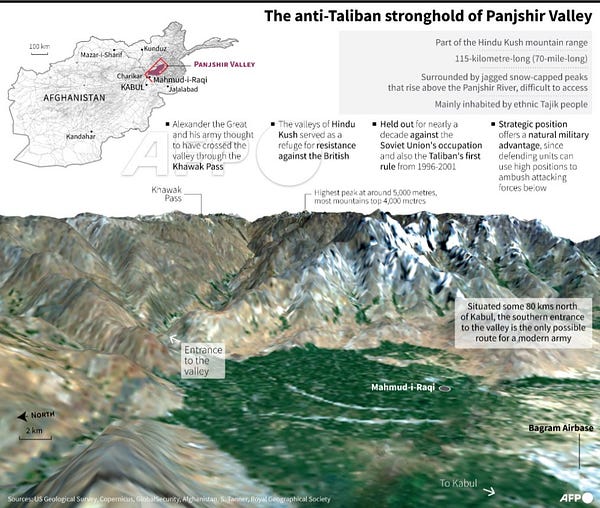
Other Stories
The challenges to security emerging from Afghanistan should be a wake-up call for the European Union. The EU needs to be more ambitious on defence and global leadership.
The Ministry of Home Affairs has sent a government team in Nepal to study the border-dispute issues with China in Namkha municipality of Humla district
The risk of climate change is escalating in Bhutan as glacial lakes stand at risk due to the melting of ice in the mountains
Export-Import Bank of India has extended $40 million worth of Line of Credit to the Maldives government to finance sports infrastructure
Myanmar’s opposition is forming fragile alliances with armed ethnic groups
Suggested Reads
Is Nepal’s Secularism Under Threat? - Kamal Dev Bhattarai - The Diplomat
Myanmar’s crisis tests in ASEAN - Kavi Chongkittavorn - Brookings Institution
Four Key Questions about Afghanistan’s Future - Michael Kugelman - Foreign Policy
India’s New Consulates and Subnational Diplomacy in South Asia - Constantino Xavier and Nitika Nayar - South Asian Voices
Authoritarianism and Resistance in Myanmar - Zachary Abuza - War On The Rocks
The Time is Ripe to Focus on India’s Water Ties with China, Pakistan and Bhutan - Amit Ranjan - The Wire
That’s it for today! I hope you enjoyed this issue.
Thank you for subscribing to this newsletter. If you found it interesting, please share it with friends, colleagues and family.
This Newsletter is written by Ameera Rao, a Research Assistant at the Takshashila Institution. She has previously completed a BA (Hons) in International Relations from King’s College London.





